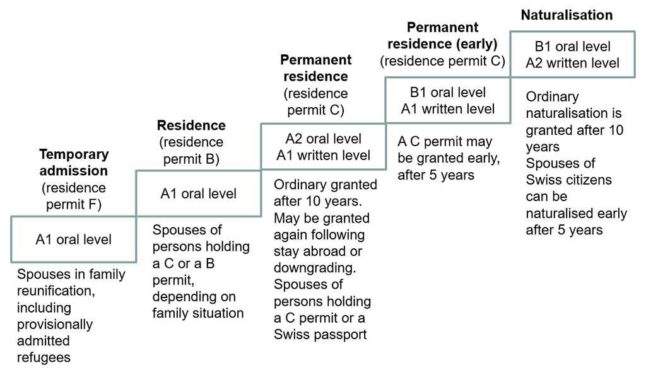For anyone wanting to obtain Swiss citizenship through naturalisation, you will need to demonstrate proficiency in one of Switzerland’s national languages.
READ MORE: Would you pass Switzerland’s citizenship exam?
Switzerland has four official national languages: German, French, Italian and Romansh.
Fortunately, you only need to be proficient in one of these languages.
English, while widely spoken in Switzerland, is not an official language of Switzerland and English proficiency will not grant you Swiss citizenship.
Note: if you are going for residency, rather than citizenship, the language standards are different. Click the following link for more information.
EXPLAINED: Everything you ned to know about Swiss language tests for residency
What are the language rules for becoming Swiss?
Fortunately, Switzerland has relatively recently changed its language requirements, making them far less confusing to understand and navigate.
Decent language skills have always been necessary for Swiss citizenship but requirements used to vary depending on the canton.
READ MORE: Five Swiss German phrases to make you sound like a local
But under the 2018 changes, which came into effect on January 1st, 2019, there is now a uniform minimum level of language proficiency required on a federal basis.
Candidates must demonstrate A2 level writing ability (elementary) and B1 (intermediate) spoken skills. This is the level set out in the Common European Framework of Reference for Languages.
This must be done through an accredited test centre. The accreditation process is handled at a cantonal level.
The new rules were designed to harmonise the language requirements for residency across Switzerland rather than the previous situation where different cantons had different rules.
Previously, there was no consistency in language testing, with many cantons in the French-language region making a judgment based on the candidate’s oral skills.
Cantons are free to set a higher bar if they wish, as Thurgau has done by requiring citizenship candidates to have B1-level written German and B2 (upper intermediate) spoken German. The rules are also stricter in St Gallen and Schwyz.
The following table illustrates the level of Swiss language you need to speak for various permits, including for naturalisation.

Which language must I speak?
Moving to Switzerland, it may appear you have three world languages to choose from, although by and large this is not the case.
As the tests are done at a communal level, the language in the commune in question is the one you need to speak.
Therefore, if you have flawless French and live in Schwyz, you need to improve your German in order to make sure you pass the test.
While some Swiss cantons are bilingual, this is comparatively rare at a municipal level.
A Swiss Federal Supreme Court case from 2022 held that a person is required to demonstrate language proficiency in the administrative language of the municipality in which they apply, even if they are a native speaker of a different Swiss language.
In that case, a Cameroonian who arrived in Switzerland at the age of eight with French as her native tongue was required to demonstrate proficiency in German in order to be successfully naturalised in the German-speaking commune of Thun.
Why does Switzerland want language proficiency?
Most countries impose some form of language test for acquiring citizenship.
Switzerland, as a multi-lingual country, is relatively unique in that you can demonstrate this proficiency by speaking a variety of different languages.
While it is certainly possible to get by speaking only English in some parts of Switzerland, speaking a local language is a way of demonstrating you are integrated in society.
The Swiss government has referenced this directly, saying the goal is not only to ensure you have an accurate comprehension of the language, but that you can communicate with those around you as part of day-to-day life.
“The ability to communicate was a key element in the formulation of the language requirements set in the ordinance. Furthermore, residence status should not depend on a person’s ability to speak accurately – this assumes a certain level of education – but to communicate in everyday situations, for example with work colleagues or with one’s children’s teachers”.
How do I prove my language credentials?
Due to the 2018 changes, foreigners need to prove their language proficiency with an accredited institution from the following list, rather than at the discretion of each canton.
Generally, a certificate from a registered language school showing you have achieved the necessary level will be required.
What if I am from Germany, France or Italy?
A large proportion of Switzerland’s residents come from countries where a Swiss language is spoken.
Based on figures released before the pandemic, 14.9 percent of Switzerland’s foreign residents come from Italy, 14.3 percent from Germany and 6.3 percent from France.
Fortunately, you are exempt from having to prove your language competency if your native language is one of the Swiss national languages.
READ ALSO: 18 interesting facts about Switzerland’s fourth language, Romansh
If you have done five years of compulsory schooling in Switzerland or if you have a secondary school leaving certificate or tertiary qualification completed in a Swiss national language, then you also don’t need to prove your language credentials.
If you studied in Switzerland, you can demonstrate language proficiency through a high school Matura certificate, even if the language in question was studied as a foreign language.
Are there any exceptions?
Speaking the language is one of the clearest ways to illustrate integration – and Swiss immigration officials take the question of integration very seriously.
As we’ve discussed in our following report, people who speak a Swiss language perfectly have been knocked back for a variety of seemingly minor reasons, including not knowing the names of local restaurants or not liking hiking, with officials saying these were signs of insufficient integration.
READ MORE: The ten most surprising questions on Switzerland’s citizenship exam
The only exception is if you can provide evidence of why they cannot learn the language, for instance a medical certificate from a speech therapist, however it is still up to the canton to decide whether this is sufficient.
A proposal from 2016 in the canton of Zug – the low-tax Swiss canton with the most millionaires per capita – sought to create an exception for people with over 20 million francs to get a residency permit, but it was rejected.
Informally, some have argued that the super wealthy have found a way around the language requirements.
According to the New York Times, one of Switzerland’s most famous residents – Tina Turner, who lives on Lake Zurich – doesn’t speak German, despite having traded her American passport for a Swiss one in 2013.
Unfortunately, anyone else hoping for a ‘Queen of Rock and Roll’ exception is likely to be disappointed.



 Please whitelist us to continue reading.
Please whitelist us to continue reading.
I think it is important to point out that is not about completing a language course but rather passing a test from Goethe or TELC, among others.
Yep, good point pcanas23. Have amended now.